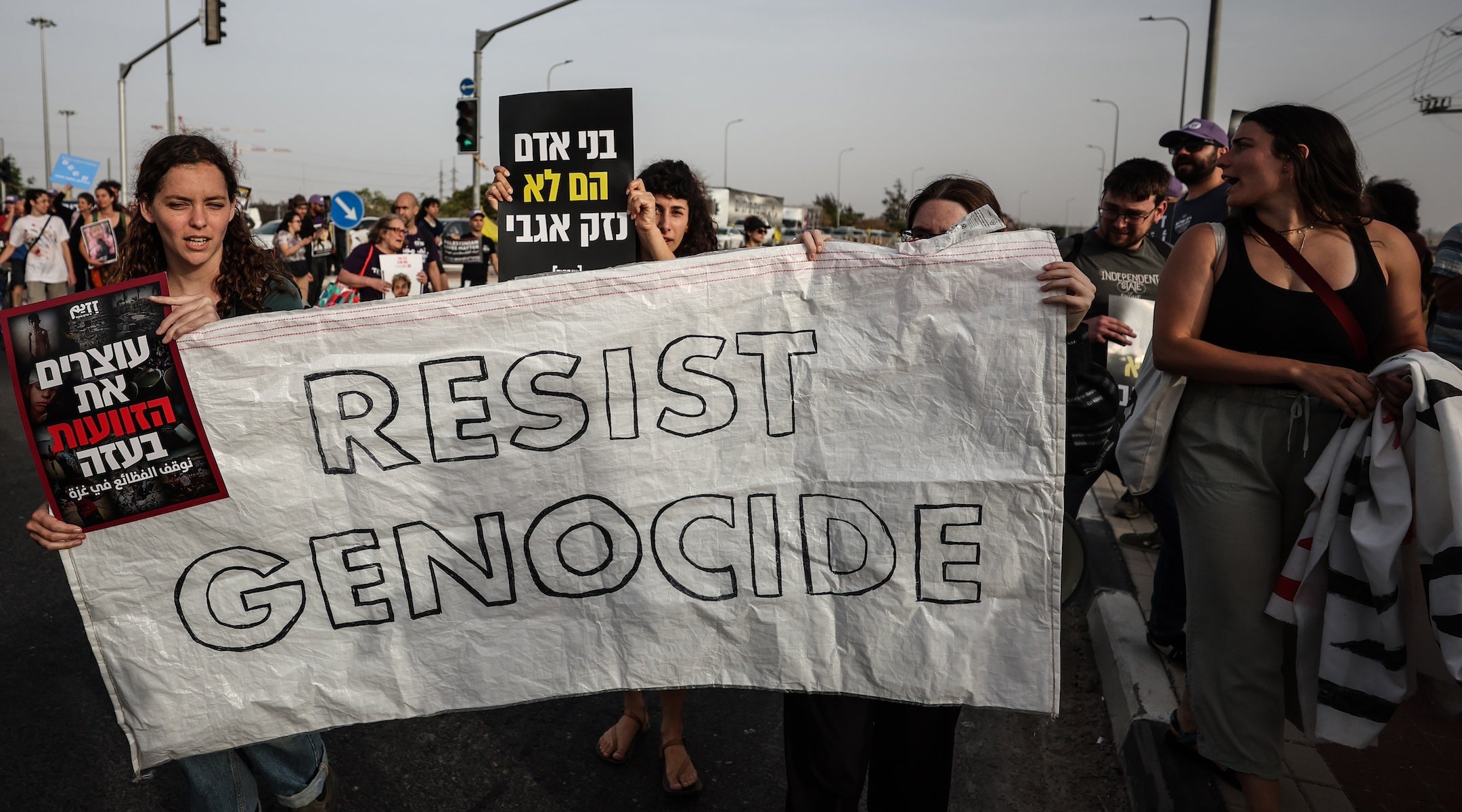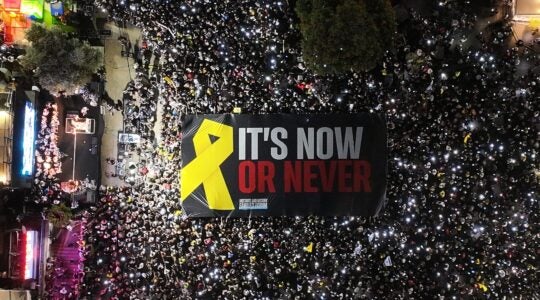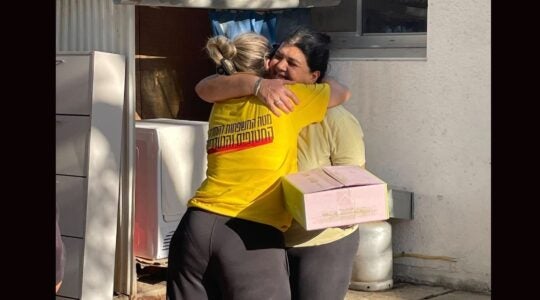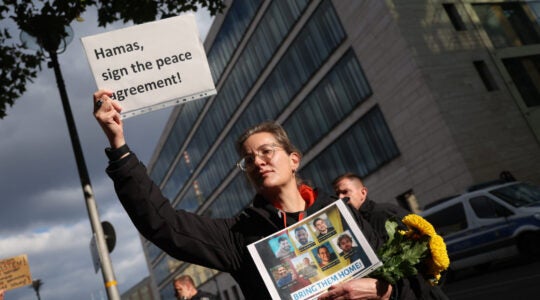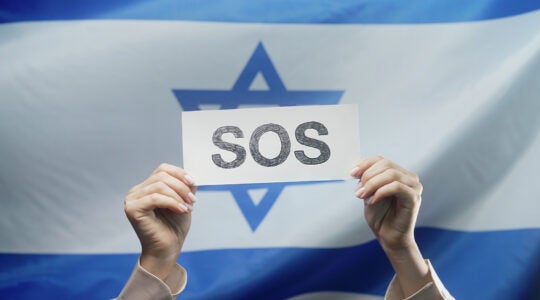Elana Sztokman said there was no one event that led her to use the term “genocide” to describe Israel’s escalation of its war against Hamas in an essay she sent to her Substack subscribers.
An American-born writer living in Israel for the past 30 years, she recounted the daily toll of Israel’s campaign in Gaza and the images of skeletal Palestinian children that have emerged since Israel imposed a humanitarian aid blockade when it ended the last ceasefire.
“Maybe it was seeing another whole family killed in Gaza. Or maybe it was just every single day seeing these images,” she said in an interview. “I woke up and said, ‘I can’t just keep going on as if this is all OK, as if this is normal.’”
On Sunday, she used a word that she and many other American and Israeli Jews have been loath to employ during the war that followed Hamas’ devastating Oct. 7, 2023, attack on Israel, even as Israel’s fiercest critics freely wielded it.
“Right now, We, Israel, are starving and bombing a nation to death,” she wrote. “Genocide. This is genocide. This is purposeful, deliberate, unrestrained killing of a people.”
The backlash to her post, she said, was enormous. Sztokman said she lost friends. Readers called her anti-Israel, despite the fact that all of her four adult children or their spouses have been called up for military service since Oct. 7. And others said that as ugly as the war has been in Gaza, it had failed to meet the legal definition of genocide and, moreover, was justified in the name of Israel’s self-defense.
And yet, if Sztokman was breaking a taboo in Jewish discourse, she was not alone. Israel’s escalation of the war, the killing and displacement of tens of thousands of Palestinians, and especially its decision to withhold humanitarian aid amid widespread reports of a hunger crisis in Gaza, has seen others who once defended Israel’s response to Oct. 7 using harsh language, including the “genocide” charge and accusations of war crimes, to describe Israel’s actions.
The shift has been so pronounced that a Dutch Jewish influencer who has opposed the war from its start turned it into a meme. “P.O.V. You’re a liberal and you just called an 18-month-old genocide a genocide for the first time,” Jelle Zijlstra posted on Instagram.
Although hardly widespread among American Jews or Israelis, the language suggests a shift in opinion, or perhaps a willingness to express it. Nineteen months into a war that shows no signs of ending — with neither Israel nor Hamas appearing to budge on their conditions for a ceasefire — qualms about the war and Israel’s aims are erupting to the surface.
In one example, an Israeli combat soldier who served in Gaza published an essay on Facebook on Tuesday saying that while he had fully supported Israel’s war after Oct. 7, his position had changed over time.
“The Holocaust is unfortunately not the only genocide … Genocide doesn’t require concentration camps and doesn’t require a racial ideology or Zyklon B,” wrote Itamar Schwartz. He added, “Israel is committing ethnic cleansing in Gaza. And if we don’t stop, beg for the Palestinian nation’s forgiveness and help it rehabilitate, Israel’s days are nearing their end.”
The most prominent Israeli to denounce the current phase of the war in what had previously been unthinkably harsh language is Yair Golan, a left-wing politician and former deputy chief of staff of the Israel Defense Forces. In an interview with the Kan public broadcaster, Golan said that “a sane country does not fight against civilians, does not kill babies as a hobby, and does not give itself the aim of expelling populations.”
On Monday, the United Kingdom, France and Canada jointly issued their own uncharacteristically blunt statement on the situation in Gaza and the West Bank. They warned that Israel’s denial of humanitarian assistance to the civilian population in Gaza “is unacceptable and risks breaching International Humanitarian Law.” The statement also declared that “Permanent forced displacement” — referring to remarks by far-right members of the government that one goal of destroying Gaza is “voluntary migration” — “is a breach of international humanitarian law.”
“We have always supported Israel’s right to defend Israelis against terrorism,” the statement read. “But this escalation is wholly disproportionate.”
In the United States, some rabbis have been striving to express their support for Israel’s existence, security and the hostages still being held by Hamas, while describing their anguish over a phase of the war that, as Golan described it, further risks turning Israel into a pariah state.
On Saturday, Stephanie Kolin, a rabbi at Congregation Beth Elohim in Brooklyn, discussed the war in Gaza in her sermon, quoting a report in the left-leaning Israeli magazine +972 about acute malnutrition among children in Gaza.
“Right now, in Israel, there is a blockade barring the entry of food into Gaza. This is the longest blockade of the war, at 77 days long. And children are dying,” she said. Kolin was careful to note that Hamas seemed unmoved by the war’s impact on innocent Gazans, but concluded, “To starve innocent children is either immoral indifference or calculated cruelty. Either way, it is a humanitarian tragedy and it cannot stand.
“I am sorry I am telling you this; it is horrible and worse to share on Shabbat, and I am sorry,” she said. “But the moment is urgent.”
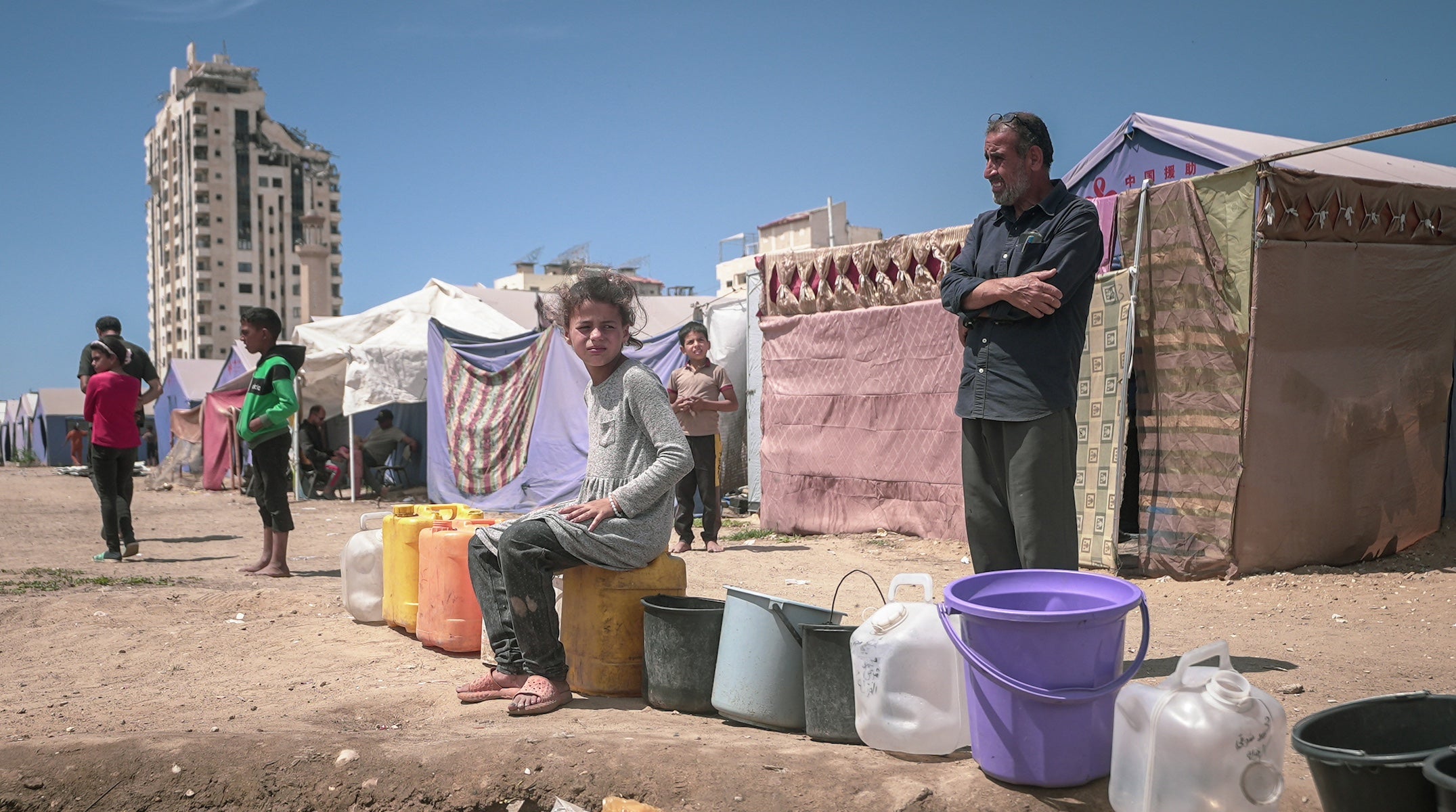
Displaced Palestinians line up and wait to fill their containers with water in Gaza City, May 6, 2025. (World Food Program)
Kolin is a Reform rabbi; earlier this month, the president of the Union for Reform Judaism, Rabbi Rick Jacobs, wrote an oped for the Washington Post urging Israel to abandon a policy of “starving Gazan civilians.”
He wrote, “A just war, such as Israel’s efforts to prevent Hamas from attacking it again and curtailing its governance in Gaza, must be fought with just means that align with both international humanitarian law and the values of Jewish rules of war.”
Another staunch supporter of Israel this week expressed deep qualms about “Gideon’s Chariots,” as Israel has described its latest operation. Hen Mazzig, an Israeli influencer who has often defended Israel on social media, wrote on Instagram Tuesday that Israel is only growing more isolated while “the hostages are still in Gaza.”
Although he avoided direct criticism of the aid blockade or expanding military operations, he was deeply critical of what he called Israel’s “failed leadership. “
He wrote, “I won’t apologize for demanding better. Not from Hamas — we know what monsters they are. But from us. From those who claim to lead in our name.”
Israel’s government and many of its supporters adamantly reject language accusing Israel of misconduct in the war, as seen in the response to Golan’s remarks. Israeli Prime Minister Benjamin Netanyahu accused Golan of “wild incitement,” saying, “Golan and his friends on the radical Left are echoing the most contemptible antisemitic blood libels against IDF soldiers and the State of Israel. There is no limit to the moral rot.”
The World Jewish Congress cancelled a private talk Golan was scheduled to give to members of the organization. The Zionist Organization of America called Golan a “traitor,” saying his remarks “will be praised by every Jew-hating Israel basher on earth.”
Talk of teachery and incitement reflects not only a government’s aversion to criticism, but a longstanding sense among Israel and its supporters that the country is held to a double standard in war and peace, and that NGOs and international courts wielding the “genocide” charge and war crimes accusations are deeply biased against the Jewish state, if not antisemitic.
In March, Atlantic staff writer Michael Powell interviewed what he said were frustrated Jewish employees at human rights groups such as Amnesty International, Human Rights Watch and Doctors Without Borders, all of which have accused Israel of crimes against humanity and acts of genocide, going back to the earliest months of the war. The workers complained that the groups demonstrated far greater urgency in documenting and denouncing Israel’s conduct than that of Hamas and fellow terror group Islamic Jihad.
Some Jews discomfited by the war hesitate to join the pile-on or accept the government’s stated goal of using admittedly harsh measures to dismantle Hamas’s military and governing capabilities, and secure the release of Israeli hostages.
Many also say that as deadly and relentless as the war has been, Israel’s actions are well within international law. Criticizing the joint statement by Britain, France and Canada, Shany Mor, an Israeli lecturer in political thought, wrote Monday that Israel is not obligated under international law to provide humanitarian aid nor respect Gaza’s boundaries.
“Nowhere in international law are belligerent parties in a war obligated to ensure supplies and logistics for their enemies. In most wars, the opposite is the case,” he wrote in the Jewish Chronicle. Meanwhile, “By insisting that Hamas can’t lose any territory in the war it launched, the international community has invented a norm that never before existed.”
Mor’s essay was seconded, and shared on Facebook, by Joe Schwartz, director of educational innovation at The Jewish Agency for Israel. He wrote that Rick Jacobs and other rabbis critical of the latest phase in the war “are all making a mistake here, misled by a seeming consensus that badly misunderstands our legal and moral obligations, and leaves out of the equation our existential imperatives.”
While writing that he too is disturbed by the plight of Gazan civilians, Schwartz wrote that “Israel must fight this war and must win. It of course must do so within the bounds of morality and legality; however, there is no moral or legal obligation for a belligerent party to supply its enemy or facilitate the transfer of supplies to its enemy.”
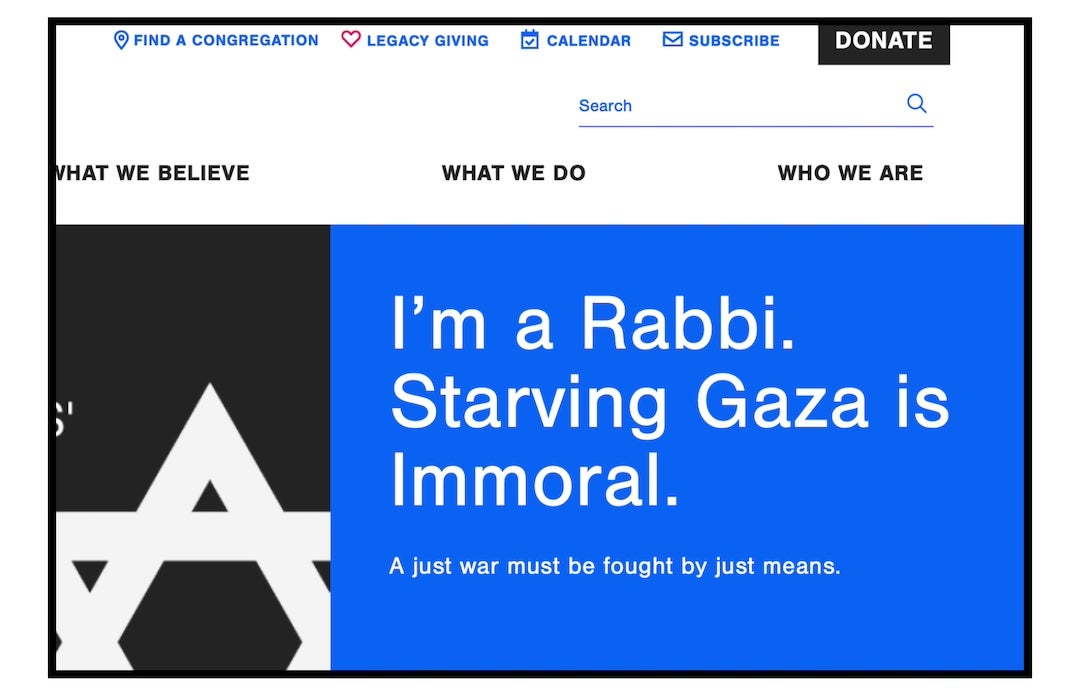
The homepage of the Union for Reform Judaism features an oped by its president, Rabbi Rick Jacobs, May 20, 2025. (Screenshot)
Some Jewish critics of the aid blockade and military operations that have killed and displaced tens of thousands of Gazan civilians have weighed these arguments and found them wanting. Rabbi Jay Michaelson, a columnist for the Forward, wrote this month that while he defended Israel’s military in the immediate wake of Oct. 7 — including rejecting the genocide charge — he has since changed his mind.
“Israeli bombs do not distinguish between Hamas supporters and the thousands of Palestinians in Gaza who have turned out to protest Hamas,” he wrote. “And the use of mass starvation as a military tactic? This is beyond inhuman. It is genocide.”
Michaelson cited the U.N Genocide Convention, which defines genocide as the “intent to destroy, in whole or in part, a national, ethnical, racial or religious group.” Elsewhere, Michaelson also cited far-right members of the Israeli government, like Finance Minister Bezalel Smotrich and National Security Minister Itamar Ben-Gvir, who have advocated fiercely for cutting off humanitarian aid and reclaiming territory from the Palestinians in Gaza.
Responding to Schwartz’s Facebook post, Michaelson wrote that Ben-Gvir, Smotrich and others “have openly called for” ethnic cleansing. In “destroying most of Gaza, crowding the remnant into a huge refugee camp, and hoping they will simply leave right now,” he wrote, “the government is balancing their genocidal intention with the military’s stated strategic goal.”
Sztokman said she is less interested in legal definitions of genocide than she is in stopping a war that has claimed so many lives, that shows no signs of ending and that continues to endanger the remaining hostages she worries are in the line of fire.
“We the Jewish people believe that we are the good guys and the chosen people. But we are not the good guys in this story,” she said, her voice breaking with emotion. “As painful as it is, this is the fact — we are doing unbearably awful things. It’s unbearable. Unbearable.”
Netanyahu may not be heeding such rhetoric from his own citizens, but he appears to be paying attention to world opinion. On Monday, amid mounting U.S. pressure to end the aid blockade, he ordered the immediate resumption of “basic” humanitarian aid. That day, five trucks entered Gaza.
JTA has documented Jewish history in real-time for over a century. Keep our journalism strong by joining us in supporting independent, award-winning reporting.
